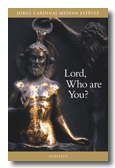Cardinal Medina Estévez devotes over thirty brief but insightful chapters to the names given to Jesus Christ in the Old and New Testaments, discussing the attributes associated with each of these divine appellations. Resembling in format the traditional litanies prayed in honor of Christ and his saints, Lord Who Are You? represents a unique “scriptural litany.” As such, this easy-to-read work offers rich opportunities for meditation and learning.
Former Prefect for the Congregation of Divine Worship, Cardinal Medina Estévez covers names well known to Christians—Bread of Life, Bridegroom, Messiah, King, Lamb and Redeemer. In addition, the unique relationship of the Catholic Church, as the Mystical Body of Christ, to the inspired Word of God is clearly profiled in scriptural identifiers such as Apostle, Bishop, and Son of Mary.
 Though not primarily a work of apologetics, Lord Who Are You? is—by the biblical nature of its spirituality—an unambiguous statement of the essentials of the faith. Cardinal Medina Estévez takes quite literally Christ’s teachings on the Eucharist, the priesthood and the primacy of Peter, to name just a few of the things which “reformers” both old and new tend to overlook. At the same time, his judicious and thoughtful treatment of the Bible should dispel the obscurantist stereotypes often associated with Catholicism.
Though not primarily a work of apologetics, Lord Who Are You? is—by the biblical nature of its spirituality—an unambiguous statement of the essentials of the faith. Cardinal Medina Estévez takes quite literally Christ’s teachings on the Eucharist, the priesthood and the primacy of Peter, to name just a few of the things which “reformers” both old and new tend to overlook. At the same time, his judicious and thoughtful treatment of the Bible should dispel the obscurantist stereotypes often associated with Catholicism.
For example, “the priesthood of Christ is absolutely unique.” Hence, there are no “successors” of Christ in the way that there are “successors” of Peter and the apostles. Rather, “in each sacramental act, the visible minister is no more than an instrument of the invisible High Priest, Jesus Christ.” Yet just as the coming of the Messiah represents the fulfillment of Hebrew prophecy, so the sacerdotal nature of the Church founded on Pentecost represents the full realization of “the priesthood of Christ… according to the order of Melchizedek.” In other words, there is more than a theological continuity between the Jewish and the Christian Church. There is also a physical and sacramental one.
If there is some truth to the old canard that “Catholics don’t know the Bible,” Cardinal Medina Estévez makes it clear that plenty of non-Catholics betray their scriptural illiteracy by taking the words of the Bible out of their proper historical and religious context. For example, he points to the undeniable hierarchical character of the early Church. The author discusses the importance of the name of “bishop” (episcopum)—derived from the Greek word episkopon—which means “overseer” or “guardian.” It is a term applied first and foremost to Christ, “the Shepherd and Guardian of your souls” (1 Pet. 2:25). But, as the Cardinal’s book shows very well, it is a name employed extensively in the Apostolic Church, as seen in the Acts and in the Epistles of St. Paul, with reference to those ministers granted the full charism of priestly powers by Christ—initially to his chief disciples, and thereafter to their successors.
This is a work rich in spiritual possibilities, and it encourages readers to plumb more deeply into the Word of God.
Matthew M. Anger
Chester, Va.
Recent Comments